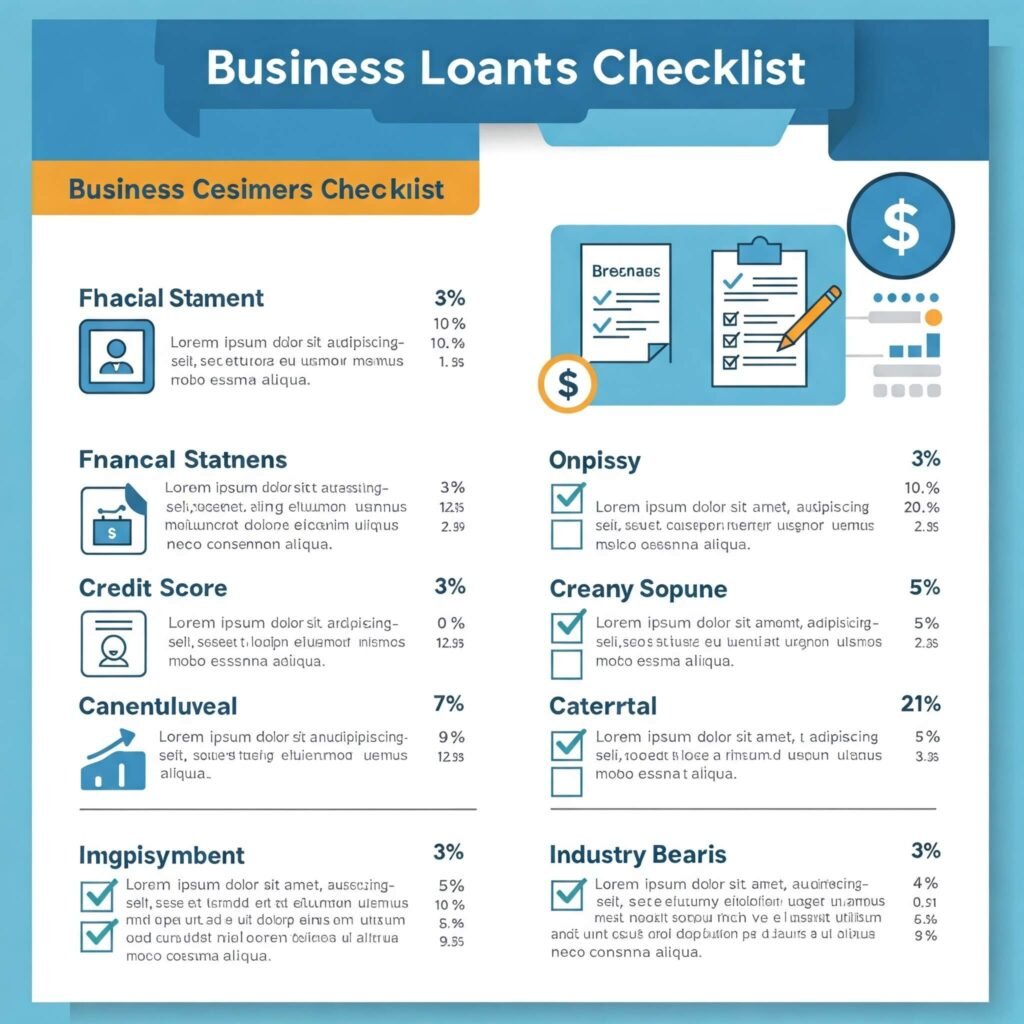A killer business idea, right? Or maybe your existing business is absolutely crushing it, and you’re ready to scale, expand, or just finally buy that fancy espresso machine for the office (priorities, people!). Whatever it is, at some point, you’ll probably think about getting a business loan. And that, my friends, is where things get… interesting.
Because let me tell you, when I first dipped my toes into the glorious, murky waters of small business funding, I thought it was pretty straightforward. “Need money, apply for money, get money. Easy lemon squeezy.” Oh, how naïve I was. I quickly learned that there are so many business loan requirements that most applicants totally overlook. Stuff that seems minor but can absolutely derail your application faster than a squirrel trying to cross a busy highway. And trust me, I’ve had my share of loan application squirrels.

My Origin Story: From Optimistic Dreamer to Paperwork Nightmare
My first real encounter with the loan world was a few years back. My little online boutique was growing, which was awesome, but I desperately needed capital to expand inventory and maybe, just maybe, hire an actual human assistant instead of just yelling at my dog, Buster, to “answer the phone!” (He’s not great at it, for the record.)
I figured, “I’m a good person, my business is doing well, banks love good people and growing businesses, right?” So I confidently walked into my local bank, armed with my business plan (which, looking back, was probably more of a “business suggestion” written on a napkin), and a whole lot of optimism.
The loan officer, a very polite but unsmiling woman named Ms. Henderson, listened patiently. Then she started asking questions. “Do you have three years of consistent cash flow statements?” “What’s your debt-to-equity ratio?” “Can I see your personal financial statements for the last five years, including tax returns and proof of assets?”
My brain just kinda short-circuited. Cash flow what now? Debt-to-equity who? I thought I just needed to show them my pretty website and promise I’d pay them back! It was like being asked to solve a quadratic equation when I thought I was just ordering a latte. I left that meeting feeling utterly deflated, with a stack of forms that looked like they were written in ancient Sumerian. That was my painful introduction to the business loan requirements I had completely, utterly, obliviously overlooked.
Why Lenders Are So Picky (It’s Not Personal, Mostly)
You gotta understand, from a lender’s perspective, they’re basically handing you a pile of money and trusting you to give it back, with interest. It’s like lending your favorite sweater to your friend – you hope they’ll give it back clean and intact, but you secretly know there’s a 50/50 chance it’ll come back with a mysterious stain and smelling faintly of stale pizza. Banks are just trying to minimize their pizza-smell risk.
So, while it feels like they’re intentionally trying to trip you up, they’re really just trying to assess your risk. They want to know:
- Can you pay them back?
- Will you pay them back?
- Do you have a plan if things go sideways?
And the answers to those questions aren’t found in your charming smile or your fantastic personality (though those help!). They’re in the nitty-gritty details. The stuff we entrepreneurs, who are usually more about big ideas than meticulous paperwork, tend to shove into a shoebox under the bed.
The Sneaky Stuff: Business Loan Requirements That Get Overlooked ALL THE TIME
Alright, pull up a chair, grab a coffee (or a whiskey, I won’t judge), and let’s talk about the specific things that trip up so many small business owners. These are the unsung heroes (or villains, depending on your perspective) of the loan application process.
1. Your Personal Credit Score (It’s Not Just About the Business, Darling!)
- The Myth: “This is a business loan, so my personal credit score doesn’t matter.”
- The Reality: Oh, honey, it matters. A lot. Especially for small businesses or startups. Lenders see you and your business as intertwined, especially if your business is young. They’re looking at your personal financial history to see if you’re responsible with money. Did you pay your student loans on time? Are your credit card balances sky-high? This is often one of the biggest business loan requirements that catches people off guard.
- My Messy Anecdote: I once got dinged because of a forgotten medical bill that went to collections a few years prior. It was like $80! Eighty dollars! I thought, “Who even cares about that?” The bank did. They cared. Ms. Henderson very politely informed me it reflected a “lack of attention to detail.” Ouch. So, check your credit report months before you even think about applying. Seriously.
2. Undocumented Cash Flow & Messy Books (The Shoebox Under the Bed Syndrome)
- The Myth: “I know how much money is coming in and going out! It’s all in my head!” or “I’ll just get my QuickBooks updated next week.”
- The Reality: Lenders need verifiable, organized financial statements. We’re talking Profit & Loss statements, Balance Sheets, and Cash Flow statements. Not just for last year, but often for the past 2-3 years. And they need to be consistent and clear. If your “books” consist of crumpled receipts and vague notes in a spreadsheet, you’re in for a rude awakening.
- My Messy Anecdote: I used to do my own bookkeeping, which mostly involved me staring blankly at a spreadsheet and hoping for the best. When Ms. Henderson asked for “auditable financial records,” I almost laughed. I had to scramble, hiring a freelance bookkeeper to make sense of my chaotic notes. It cost me money and time, delaying my application by weeks. Don’t be like me. Get your financial house in order before you need the money. It’s a critical business loan requirement.
3. Lack of Collateral (What Are You Offering if You Can’t Pay?)
- The Myth: “My business idea is so great, it’s its own collateral!”
- The Reality: Unless you’re a well-established company with significant assets, lenders often want something to back up the loan. This is called collateral. It could be real estate, equipment, inventory, or even accounts receivable. For some loans, they might ask for a personal guarantee, meaning your personal assets (like your house) are on the line if your business defaults.
- My Messy Anecdote: My business was mostly digital products and services. My “assets” were my laptop and a slightly dusty ergonomic chair. Not exactly collateral material. It meant my loan options were more limited, and the interest rates were higher because I was a higher risk. I eventually had to secure a smaller loan than I wanted, and it felt like a setback. Know what you can offer as collateral – or be prepared for different loan types.
4. An Underdeveloped Business Plan (More Than Just a Dream)
- The Myth: “My passion will shine through! They’ll just get my vision!”
- The Reality: A business plan isn’t just a formality; it’s your roadmap. Lenders want to see that you’ve thought through everything: your market, your competition, your marketing strategy, your management team, and detailed financial projections (like, how exactly will you use the loan, and how will it generate revenue to pay it back?). They want to see numbers, not just enthusiasm.
- My Messy Anecdote: My initial business plan was essentially a glorified mood board with some wishful thinking sprinkled in. Ms. Henderson gently pointed out that my “market analysis” consisted of “everyone with a credit card who likes pretty things.” Not exactly data-driven. I spent weeks refining it, researching demographics, analyzing competitors. It was grueling, but honestly, it made my business stronger, even if it felt like pulling teeth at the time. A solid business plan is arguably the most vital of all business loan requirements.
5. Insufficient Time in Business (The “Too Young to Drive” Problem)
- The Myth: “I launched last month, but we’re already rocking it! That counts, right?”
- The Reality: Most traditional lenders (like banks) prefer businesses that have been operating for at least 2-3 years. They want to see a track record of stability, revenue, and profitability. If you’re a startup or a very young business, your options are often limited to alternative lenders, microloans, or grants, which might have different (but still important!) requirements.
- My Messy Anecdote: My business was, at the time, only about 18 months old. Ms. Henderson said, “That’s wonderful! Come back when you have another year under your belt.” It was like being told I wasn’t old enough to ride the roller coaster. Totally fair, but incredibly frustrating when you’re eager to grow. This is why planning ahead is key.
6. Not Knowing Your Loan Type (It’s Not One-Size-Fits-All)
My Messy Anecdote: I initially just asked for “a loan.” Ms. Henderson then patiently explained the dozen different types available. I felt like I was in a foreign language class. Understanding which loan is best for your specific situation (e.g., equipment vs. working capital) is a crucial, often overlooked, business loan requirement.
The Myth: “A loan is a loan, right?”
The Reality: There are so many types of business loans: SBA loans, term loans, lines of credit, equipment financing, invoice factoring, merchant cash advances. Each has different requirements, interest rates, and repayment structures. Applying for the wrong type of loan for your business needs can be a huge waste of time.
My Hard-Earned Wisdom: How to NOT Overlook These Things
So, how do you avoid my mistakes and make the loan application process smoother?
- Start Early: Don’t wait until you desperately need the money. Start preparing your documents, cleaning up your books, and checking your credit score months in advance.
- Get Professional Help: Seriously. A good accountant or bookkeeper is worth their weight in gold. They’ll make your financial statements shine.
- Educate Yourself: Spend time researching different loan types and what lenders are actually looking for. The SBA website (Small Business Administration) is a fantastic, free resource in the U.S.
- Be Realistic: Don’t ask for a million dollars if your business is making five thousand. Be honest about your current financial situation and what you can realistically handle.
- Practice Your Pitch: Even for a traditional loan, you’re selling your business. Be able to articulate your vision, how the loan will help, and your repayment strategy clearly and concisely.
The Bottom Line: Preparation is Your Superpower
Applying for a business loan isn’t about luck or charm (though again, they don’t hurt!). It’s about preparation. It’s about having your ducks in a row, even the ducks you didn’t know existed.
My initial loan application was a disaster, but it was a valuable lesson. It forced me to get my financial house in order, to understand my business better, and to learn about the funding landscape. The next time I applied, I was ready. I had my clean books, my polished plan, and my ducks were practically marching in formation. And you know what? It went so much smoother.
So, if you’re thinking about a business loan, take a deep breath. Don’t be intimidated. Just be prepared. Focus on those often-overlooked business loan requirements, and you’ll be well on your way to getting the funding you need to take your business to the next level. And maybe, just maybe, finally get that fancy espresso machine. You earned it.
Outbound Links:
- For comprehensive and reliable information on all things small business financing, the Small Business Administration (SBA) website is gold. It’s a bit dry, but totally worth it. Check out their section on SBA Business Loans.
- And for a more relatable, non-boring perspective on small business finance and avoiding common pitfalls, I often look for articles from entrepreneurship blogs. This article from Entrepreneur on loan application tips often gives good, actionable advice: Entrepreneur – Business Loan Tips (This links to a general “business loans” tag on Entrepreneur.com, which should have relevant articles).





